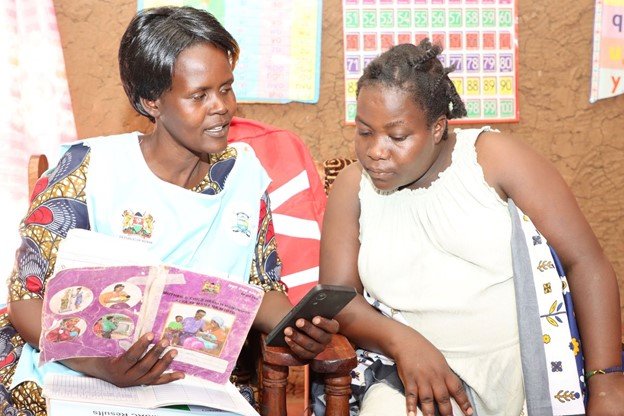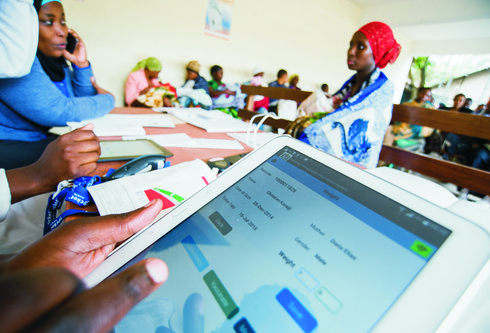During Climate Week New York City, Digital Square at PATH launched the Global Goods Guidebook Climate Services for Health Annex: Harnessing Digital Solutions for Climate-resilient Communities, a new resource featuring open-source digital tools that connect climate, weather, and health data for strengthened health systems.
The Annex is envisioned to help country leaders improve capacity to create predictive models, identify early threats such as extreme weather and heat, and build smarter, faster, targeted responses.
As extreme weather, shifting disease patterns, and deepening health inequities accelerate, a new generation of digital tools is emerging. Built at the intersection of climate science and public health, these tools have the potential to save lives, guide policies, and strengthen health systems under pressure.
How can governments, donors, and implementers identify digital solutions that are both climate-relevant and publicly accessible? That’s the question this new guidebook aims to answer.
A collaborative approach to climate-ready health systems
Developed under the PATH-led Digital Public Infrastructure for Climate and Health (DPI4CH) project, the guidebook is part of a broader initiative funded by Wellcome and The Rockefeller Foundation, in collaboration with the World Health Organization (WHO) – World Meteorological Organization (WMO) Climate and Health Joint Programme, to improve knowledge sharing across climate and health experts and identify and share climate-informed trusted digital tools for health.
The project aims to identify digital public health global goods—open source tools that are adaptable to different countries and contexts to help address key health system challenges—that help countries integrate climate and health data and information, enabling them to better anticipate and respond to country health needs.
Why digital public infrastructure matters
As climate change accelerates, its impacts on human health are becoming more pronounced, resulting in increased pressure on already strained health systems. These intersecting challenges require coordinated, data-driven solutions.
Digital Public Infrastructure (DPI) is a set of interoperable digital systems and foundational building blocks that enable the effective delivery of services, promote inclusion, and support governance that benefits the public to address these risks. DPI connects people, information, and digital systems such as payment platforms and digital identity in much the same way that roads and railways have historically connected communities and commerce.
When aligned with national priorities and standards, DPI supports more equitable service delivery, accountable governance, and improved system efficiency and resilience.
In the health sector, DPI enables the integration of weather forecasts, satellite imagery, disease surveillance, community health mapping, and local health system data into real-time predictive analytics, early warning systems, and targeted responses to climate-sensitive health threats, pandemics, and outbreaks that threaten local economies.
DPI helps policymakers and health leaders anticipate climate-driven health risks, adapt to changing health needs, and build stronger, more resilient health systems, especially within vulnerable communities.
What’s inside the Climate Services for Health Annex
The new Global Goods Guidebook Climate Services for Health Annex: Harnessing digital solutions for climate-resilient communities builds on the existing guidebook to identify and curate a collection of global goods recently approved as applicable for climate and health data.
The Annex is a freely available online resource that provides information on mature, open-source software applications and services that are adaptable to different countries and contexts. The guidebook is a practical resource for:
- Policymakers shaping digital or climate-health policy;
- Procurement teams sourcing adaptable tools;
- Technical implementers linking climate and health data systems; and
- Funders and donors supporting scalable, equitable digital health infrastructure.
Within the Annex, the three newly approved global goods include:
- DHIS2 Climate Application : A widely used health information platform now featuring climate data integration.
- EWARS-csd: A system for climate-informed early warnings of disease outbreaks.
- GeoPrism Registry: A geospatial tool linking health and climate data for informed decision-making.
The Annex provides criteria to designate new global goods, technical summaries of each, outlining their functionality, implementation status, user communities, maturity, and alignment with health and climate data standards. It also includes direct links to technical documentation, user groups, and other key resources.
Additional features of the Annex include real-world climate and health use cases tied to specific global goods, as well as explanations of classification criteria, interoperability standards, and licensing models.
In addition, several emerging tools are noted that are also on track for future inclusion, pending further development and wider implementation.
Building a climate-resilient future
This Annex represents a shared vision among the Joint Programme office, PATH, Wellcome, The Rockefeller Foundation, and partners: a future where digital and climate intelligence work together to protect public health. It is more than a catalog—it’s a strategic guide and a call to action.
“This Guidebook reflects what’s possible when sectors unite with shared purpose. We hope it serves as a practical resource for those working at the climate-health intersection, whether just starting out or building on existing efforts.”— Dr. Joy Shumake-Guillemot, WHO-WMO Climate & Health Joint Programme
Explore the Annex today and join the effort to build climate-resilient health systems through digital innovation.
Learn more about the Annex in our webinar below. Also available in a short version and in Spanish and French.



